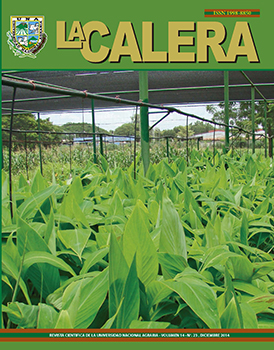Contribution of meliponicultura to the family economy at El Pochote, El Arenal and Nuevo Amanecer, Masatepe, Masaya, 2013
DOI:
https://doi.org/10.5377/calera.v14i23.2663Keywords:
Family Economics, Meliponas, Meliponiculture OrganizationAbstract
The Melipona stingless bees are native from America, and used by many families in rural Mesoamerican to obtain honey and wax, but also for many services they provide, including pollination and environmental monitoring. The study assesses the contribution of Miliponiculture to the household economy in the communities El Pochote, El Arenal and Nuevo Amanecer, municipality of Masatepe, Masaya. This research is qualitative in nature. To collect information, interviews, focus groups and case studies with producers and technicians were applied. The results showed that 14 families together have 64 beehives, 41 of which use sound boxes. Meliponiculture is focused solely on the production of honey, with a yield of 0.78 liters per producer. Revenue from the sale of honey not meet the needs for the family, it is an emerging industry and production management skills are rudimentary. Meliponiculture gross margin represented a range from 1.02% to 7% of total revenue for producers; and contributes to the economy of the 57% of families. Currently the producers add value through the use of containers of 35 ml, thus improving the sales price. The technical support of Community Alliance with its inclusive methodology and consensus, focused its work on building capacity in people, strengthened its impact on decision-making, self-management and organization on their own initiative of the group “Meliponicultores Tamagás “. Currently the community development in the area of impact is incipient and links between Meliponiculture local organizations are weak, however, the need to improve the technical levels contributes to this effort is undertaken in collaboration and reciprocity.
La Calera Vol.14 No.23, 2014, pp.89-95
Downloads
1389

